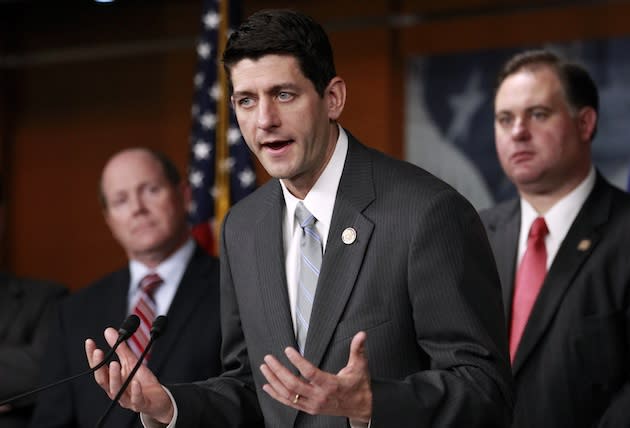 The Ticket
The TicketRepublican budget proposal reopens debate over Medicare reform

House Budget Committee chairman Paul Ryan on Tuesday plans to double down on efforts to revamp Medicare and Medicaid, unveiling a fiscal year 2013 Republican budget proposal that would make the entitlement program a "premium-support" system.
The Wisconsin Republican, previewing his plan in an op-ed for the Wall Street Journal Tuesday morning, tried to head off criticism over his budget's Medicare provisions by noting that he introduced a version of Medicare reform (ultimately unsuccessful) in his budget last year and that despite Democratic attempts to brand the effort as an attempt to "end Medicare as we know it," the proposal didn't sink Republicans politically.
Ryan writes:
"We assumed there would be some who would distort for political gain our efforts to preserve programs like Medicare. Having been featured in an attack ad literally throwing an elderly woman off a cliff, I can confirm that those assumptions were on the mark. But one year later, we can say with some confidence that the attacks have failed. Courageous Democrats have joined our efforts. And bipartisan opposition to the path of broken promises is growing."
This time around, Paul's budget includes options, including offering buy-ins to private insurance as well as a premium-support system, both of which are for Americans who are not at or near retirement age. The premium support system links support received by participants to the price of their insurance premiums. Ryan months ago joined with Democratic Sen. Ron Wyden of Oregon to lay the groundwork for the premium support plan.
As Ryan noted in his op-ed, Democrats used Ryan's plan against his party last year. In an election year, the political stakes are even higher.
Outside of Medicare—likely the focus of many Democratic attacks—Ryan's budget proposes narrowing the six current individual tax brackets to just two, 10 percent and 25 percent. It calls for reducing the highest corporate tax rate from 35 to 25 percent. It would also eliminate the Alternative Minimum Tax.
Ryan hailed these tax reforms as a significant boon for the economy.
"We want to get ahead of a debt crisis" Ryan said on CBS' "This Morning." "We want to take all the empty promises that our government is making and make sure they're not broken promises."
Ryan's budget is unlikely to win passage in Congress, but allows Republicans to sign on to a fiscal message they can contrast with the president's and allows Republicans to take a side on the Medicare issue in an election year.
Ryan steered talk away from the politics of his plan during his CBS appearance, saying that there has been sufficient talk about deficit reduction from the Republican primary candidates but that his plan offers concrete solutions: "We owe the country a choice of two futures, and that's what we're showing them today."
White House House spokesman Jay Carney on Monday mostly reserved judgement on the plan, since it had yet to be released, but expressed concern over potential changes to Medicare, how the plan would treat the middle class, and whether the plan would violate previously agreed-upon discretionary spending levels.
"I think that the calls to abrogate—to violate an agreement that everybody signed onto in August, I think as we've talked about before, has to raise questions about keeping your word, about where we are," Carney said at Monday's briefing.
Olivier Knox contributed to this story.
